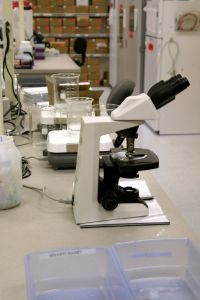Study reveals kids' views on science - and their teachers

February is National Science Literacy Month and Feb 15-21st marks National Engineers Week, when engineers across the U.S. try to encourage kids' interest in engineering careers. During National Engineers Week, the American Society for Quality (ASQ) invites K-12 educators across America to bring an ASQ engineer into the classroom to promote engineering as a career. Educators can contact ASQ at 800-248-1946 to find an engineer volunteer in their area to speak to students.
ASQ recently teamed with Harris Interactive to seek the views of kids grade 3-12 on science in schools. Harris polled 1,134 U.S. youth on behalf of ASQ December 16-28, 2009. The career-related questions were only asked of 7-12th graders.
Overall, students in grades 3-12 think rather highly of their science teachers. When it comes to knowing a lot about science, 84% of 3-12th graders say their science teachers deserve at least a grade of ‘B’, with 55% giving them an ‘A’. And this sentiment increases with grade level. Nearly nine in ten students in grades 7-12 (87%) say their science teachers deserve an ‘A’ or ‘B’ for their knowledge in science compared to eight in ten students in grades 3-6 (80%).
Science teachers seem to be able to make science both exciting to learn and engaging for their students. Around two thirds of 3-12th graders overall give their science teachers a grade of ‘A’ or ‘B’ for making science exciting and fun to learn (69%) and assigning fun projects that are hands-on (66%). Students in lower grade levels, however, tend to grade their science teachers more highly than students in upper grade levels. 3-6th graders assign these higher grades more often than students in grades 7-12 (79% vs. 62% and 76% vs. 59%).
While there is always discussion about gender differences in science, allocating equal attention to boys and girls in science class doesn’t seem to be a huge problem to students. Eight in ten students in grades 3-12 (80%) give their science teachers at least a ‘B’ in this category. And half (50%) actually give them an ‘A’. Interestingly, there are no gender or grade level discrepancies in this opinion.
In emphasizing the use of science in a future career and promoting engineering as a future career, differences emerge in the grades science teachers receive from their students1. Nearly three in five students in 7-12th grade (58%) give their science teachers a grade of ‘A’ or ‘B’ for showing them how science can be used in a future career. But only a little over a third of 7-12th graders (37%) give their science teachers a grade of ‘A’ or ‘B’ for talking about engineering as a future career. However when comparing the students who give a grade of ‘A’ for these behaviors, the difference is less notable. Under one-quarter of 7-12th graders (23%) give their science teachers an ‘A’ for showing science as a career while 14% give them an ‘A’ for discussing engineering.
Within this career discussion there are some gender differences. Male students are more likely to report that their teachers deserve higher grades for these behaviors than female students. For emphasizing the use of science in a future career, six in ten male students (62%) and half of female students (53%) give their science teachers a grade of ‘A’ or ‘B’. For talking about engineering as a future career, female students are more likely than male students to give their science teacher a failing (‘F’) grade (20% vs. 12%).
Tools and ideas to transform education. Sign up below.
In addition to their mostly positive opinions of their science teachers, many students also have a high opinion of the future implications of science – and math too. Seven in ten students in 3-12th grade (72%) think a person needs to be good at science and math to get a good paying job in the future. However, as they get older, students seem to increasingly think there are ways to obtain good paying jobs other than through math and science. 7-12th graders are less likely than 3-6th graders to believe a person needs to be good at science and math to get a good paying job (66% vs. 80%).
